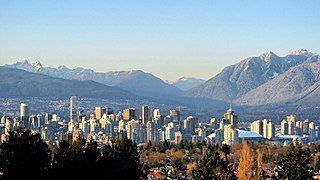
The Lower Mainland is a geographic and cultural region of the mainland coast of British Columbia that generally comprises the regional districts of Metro Vancouver and the Fraser Valley. Home to approximately 3.05 million people as of the 2021 Canadian census, the Lower Mainland contains sixteen of the province's 30 most populous municipalities and approximately 60% of the province's total population.

Greater Vancouver, also known as Metro Vancouver, is the metropolitan area with its major urban centre being the city of Vancouver, British Columbia, Canada. The term "Greater Vancouver" describes an area that is roughly coterminous with the region governed by the Metro Vancouver Regional District (MVRD), though it predates the 1966 creation of the regional district. It is often used to include areas beyond the boundaries of the regional district but does not generally include wilderness and agricultural areas that are included within the MVRD.

The University of the Fraser Valley (UFV), formerly known as University College of the Fraser Valley and Fraser Valley College, is a Canadian public university with campuses in Abbotsford, Chilliwack, Mission and Hope, British Columbia. Founded in 1974 as Fraser Valley College, it was a response to the need for expanded vocational training in the communities of the Fraser Valley. In 1988, it became a university college, with degree-granting status. As the University College of the Fraser Valley, it grew rapidly, becoming one of the largest university colleges in Canada.
This is page shows results of Canadian federal elections in the Fraser Valley region of British Columbia. As defined for this article, the Fraser Valley includes the southern suburbs of Vancouver. Areas outside the Fraser Valley, namely the Fraser Canyon and regions to its west, are also included within one of the ridings. The largest of these ridings is the Chilliwack-Hope riding. This riding also includes most of the Fraser Valley until it joins the Okanagan-Similkameen and extends westward until outside Abbotsford.

BC Cancer is part of the Provincial Health Services Authority in British Columbia, Canada.

Surrey Memorial Hospital (SMH) is a publicly funded hospital owned and operated by Fraser Health in the city of Surrey, British Columbia, Canada, adjacent to King George Boulevard.

Envision Financial, a division of First West Credit Union, is based in British Columbia, Canada. Founded in 1946, Envision Financial was established in 2001 through a merger between Lower Mainland-based Delta Credit Union, whose roots were in the fishing industry, and Fraser Valley-based First Heritage Savings Credit Union, which had historic ties to the farming and agriculture industries. First Heritage Savings Credit Union was the product of a merger between East Chilliwack Credit Union and Clearbrook District Mennonite Savings Credit Union in 1983. It is insured by the Credit Union Deposit Insurance Corporation of British Columbia.
An electoral redistribution was undertaken in 2008 in British Columbia in a process that began in late 2005 and was completed with the passage of the Electoral Districts Act, 2008 on April 10, 2008. The redistribution modified most electoral boundaries in the province and increased the number of MLAs from 79 to 85. The electoral boundaries created by the redistribution were first used in the 2009 provincial election.
Central Fraser Valley Transit System is a public transit system which provides bus services in the Central Fraser Valley area of British Columbia, Canada. Funding for the system is provided by the City of Abbotsford, the District of Mission, the University of the Fraser Valley and BC Transit, the agency responsible for planning and management of municipal transit systems throughout the province. Other than planning and managing bus routes, The Central Fraser Valley Transit System contracts out most of its bus services to FirstCanada ULC.

Peace Arch Hospital (PAH) is a 146-bed acute care facility, and Level IV trauma centre owned and operated by Fraser Health. The hospital is located at 15521 Russell Avenue, White Rock, British Columbia, Canada, and its catchment area includes South Surrey.

Royal Columbian Hospital (RCH) is among the oldest hospitals in British Columbia and one of the busiest in the Fraser Health Authority. It is located in New Westminster overlooking the Fraser River and is the only hospital in the Lower Mainland that is immediately adjacent to a Skytrain station (Sapperton).

Burnaby Hospital, is a healthcare facility located in Burnaby, British Columbia, and operated by the Fraser Health Authority (FHA). One of the largest hospitals outside the City of Vancouver, it serves the communities of Burnaby and East Vancouver. A 314-bed primary and secondary care centre, patient care services include general surgery, orthopedic surgery, medicine, perinatal, neonatal ICU, critical care and emergency services.

Abbotsford Regional Hospital and Cancer Centre (ARHCC) is a 300-bed Canadian health care facility in the City of Abbotsford, British Columbia that houses the acute care Abbotsford Regional Hospital (ARH) operated by Fraser Health and the regional cancer facility operated by the BC Cancer Agency.

Carvolth Exchange is a transit exchange and park and ride facility serving northwestern Langley Township, British Columbia, Canada. TransLink is the primary operator of the exchange, with routes to Surrey City Centre, New Westminster, Burnaby, Maple Ridge and Langley City, which provide connections to SkyTrain and the West Coast Express rail services for travel towards Vancouver. A single BC Transit express route also serves the exchange, providing service to Burnaby, Abbotsford, and Chilliwack.
An electoral redistribution in British Columbia was undertaken by the BC Electoral Boundaries Commission beginning in 2014 and was formalized by the passage of Bill 42, the 2015 Electoral Districts Act, during the 40th British Columbia Parliament. The act came into effect on November 17, 2015. The redistribution added two seats to the previous total, increasing the number of MLAs in the province from 85 to 87. The electoral boundaries came into effect for the 2017 election. The next redistribution is required to occur following the 2020 British Columbia general election.
The COVID-19 pandemic in British Columbia forms part of an ongoing worldwide pandemic of coronavirus disease 2019 (COVID-19), a novel infectious disease caused by severe acute respiratory syndrome coronavirus 2 (SARS-CoV-2). On January 28, 2020, British Columbia became the second province to confirm a case of COVID-19 in Canada. The first case of infection involved a patient who had recently returned from Wuhan, Hubei, China. The first case of community transmission in Canada was confirmed in British Columbia on March 5, 2020.
An electoral redistribution in British Columbia is underway by the BC Electoral Boundaries Commission. On October 21, 2021, the Government of British Columbia appointed Justice Nitya Iyer, Linda Tynan and Chief Electoral Officer Anton Boegman to serve as the 2021 commissioners. Justice Iyer was appointed the chair.











